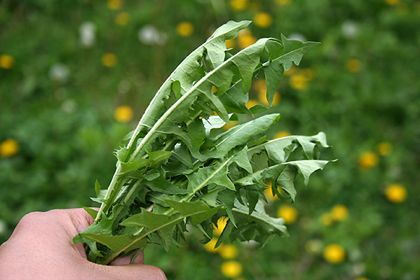
"A weed is just a plant whose virtues have not yet been discovered." - Ralph Waldo Emerson
I live in a part of California where dandelion greens grow like weeds. In...
Herbal Diuretics To Help Lose Water Weight
By Gene Bruno, MS, MHS

Do you have excess “water weight”? Do you want to reduce water retention? If you answered yes to one or both of these questions, then you may wish to consider herbal diuretics. Herbal diuretics can help promote a healthy balance of fluids in body tissues.
Make no mistake, excess fluid which is stored in the tissues has nothing to do with fat weight. The fluid is strictly water weight. Nonetheless, water weight is still an important consideration regarding a total weight loss program. This is particularly the case for women to tend to retain fluids in their tissues at a much higher rate than men. Even though the fluid retention may only be temporary, many women who are trying to lose weight feel discouraged when they put on an article of clothing some morning, and it feels tighter rather than looser. Psychologically, this discouragement may cause them to give up as they;re thinking, “What’s the use in dieting and exercising? I’m fatter than I was two weeks ago!” Of course it is only water weight, but they may not realize it. Hence the value of natural herbal diuretics which can help reduce the amount of fluid retention. Now, when they try on article of clothing, there is a good chance that it will feel looser rather than tighter. This may provide the needed encouragement to continue following their weight loss program.
Various herbs have a history of successful use for promoting a healthy balance of fluids in body tissues. One such herb is Dandelion Root Extract. Although commonly dismissed as an annoying garden weed, Dandelion has enjoyed a very favorable reputation with herbalists for centuries as a trusted liver tonic and diuretic. Dandelion is also a natural source of potassium and its use as a natural diuretic is highly encouraged since it maintains critical potassium levels. Dandelion was approved in a monograph by the European Scientific Cooperative On Phytotherapy “where enhanced urinary ouput is desirable.”1 This internationally respected set of monographs provides guidelines for the appropriate use of herbs in humans.
Another such herb is Uva Ursi. Uva Ursi contains a group of compounds that were known as early as the 13th century to have diuretic action. Uva Ursi leaves have been included in many commercial diuretic preparations. This herb is thought to act directly on the kidneys to achieve its fluid balancing effect. Uva ursi is widely used in Europe as a treatment for UTI.2 Furthermore, Uva ursi is approved in Germany for treatment of bladder infections.3 Uva Ursi contains arbutin. In the alkaline environment of the urine, arbutin is converted into hydroquinone, which kills bacteria. The actions of this herb are antibacterial, astringent and anti-inflammatory.
Regarding Buchu leaves, The Physiomedical Dispensatory states, “Their power is expended chiefly upon the bladder and its appendages...” and “A cold strong preparation increases the flow of urine; a weaker and warm preparation promotes gentle diaphoresis.”4 The Eclectic Materia Medica indicates that Buchu is a urinary antiseptic, but “as a diuretic its action is not pronounced, but it is frequently used with other agents...”5 King's American Dispensatory has a similar description of Buchu, and also states that “It is principally used in chronic diseases of the urinogenital organs, as in cases of chronic inflammation of the mucous membrane of the bladder, irritable conditions of the urethra, in urinary discharges with increased deposit of uric acid, and in incontinence connected with diseased prostate.”6
The Eclectic Materia Medica identifies Couch Grass as “A mild diuretic with slightly aperients properties, and a demulcent of value in irritated conditions of the genito-urinary organs.”7 Petersen also describes Couch grass as having demulcent and mildly diuretic properties.8 Ellingwood indicates, “The action of this agent is solely upon the urinary apparatus. It exercises a soothing, diuretic influence...” King's American Dispensatory echos the previous descriptions: “Couch-grass is diuretic and slightly aperient. It is an excellent agent in cases of excessive irritability of the bladder from any cause, lessening the frequency and pain of urination.”9
King's American Dispensatory identifies Horsetail as being diuretic and astringent. “This drug has a specific action in irritation the bladder, and in dysuria with tenesmic urging, in the nocturnal urinal incontinence of children, and in urinal incontinence, the effect of cystic irritation, it is a very serviceable remedy.”10
Other herbs such as Green Tea, Celery Seed, and Corn Silk also contribute to a positive effect in balancing fluid levels in body tissues. Any or all of these herbs may be just the ticket to helping your clothes fit better and promoting a positive attitude while you progress on your diet and exercise program.
Smart Supplementation™ is a free series of educational literature created by Huntington College of Health Sciences (HCHS) as a public service. Although copyrighted, it may be freely photocopied and distributed, but may not be altered in any way. Smart Supplementation™ is not intended as medical advice. For diagnosis and treatment of any medical condition, consult your physician.
1 Taraxaci folium: Dandelion Leaf. March 1996: Taraxaci folium pp. 1-6. IN ESCOP Monographs: The Scientific Foundation for Herbal Medicinal Products, 2nd ed. Stuttgart: Thieme; 2003. 2 European Scientific Cooperative for Phytotherapy. Proposal for European Monographs Bevrijdingslaan, Netherlands: ESCOP Secretariat; 1992, Vol. 3 3 Blumenthal M, et al, eds. The Completely German Commission E Monographs: Therapeutic Guide to Herbal Medicines. Austin, TX: American Botanical Council and Boston: Integrative Medicine Communications; 1998:224–25. 4 Cook W. The Physiomedical Dispensatory. Online version http://www.ibiblio.org/herbmed/eclectic/cook/BAROSMA_CREN ATA.htm; 1869. 5 Felter WF. The Eclectic Materia Medica, Pharmacology and Therapeutics. Online version ttp://www.ibiblio.org/herbmed/eclectic/felter/barosmabetu.html; 1922. 6 Felter HW, Lloyd JU. King's American Dispensatory. Online version http://www.ibiblio.org/herbmed/eclectic/kings/barosma.html; 1898. 7 Felter WF. The Eclectic Materia Medica, Pharmacology and Therapeutics. Online version http://www.ibiblio.org/herbmed/eclectic/felter/agropyron.html; 1922. 8 Petersen FJ. Materia Medica and Clinical Indications. Online version http://www.ibiblio.org/herbmed/eclectic/petersen/agropyron.html; 1905. 9 Ellingwood F. The American Materia Medica, Therapeutics and Pharmacognosy. Online version http://www.ibiblio.org/herbmed/eclectic/ellingwood/agropyron.ht ml; 1919. 10 Felter HW, Lloyd JU. King's American Dispensatory. Online version http://www.ibiblio.org/herbmed/eclectic/kings/equisetum.html; 1898.

I live in a part of California where dandelion greens grow like weeds. In...

By Gene Bruno, MS, MHS
Prostatitis is a swelling of the prostate gland, usually caused by infection. The patient feels urgent needs to urinate...